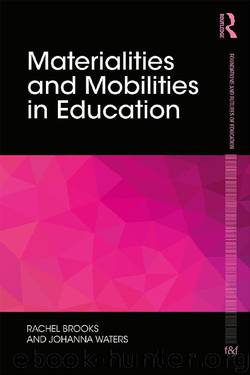Materialities and Mobilities in Education (Foundations and Futures of Education) by Rachel Brooks & Johanna Waters

Author:Rachel Brooks & Johanna Waters [Brooks, Rachel & Waters, Johanna]
Language: eng
Format: epub
Publisher: Taylor and Francis
Published: 2017-09-14T00:00:00+00:00
Conclusion
This chapter has substantiated and developed some of the theoretical ideas introduced in Chapter 4 around educational mobilities; to bring theoretical ideas ‘to life’ – to illustrate, empirically, somewhat abstract conceptualisations and to demonstrate the multi-dimensionality of everyday mobilities. The chapter has achieved this through two ‘portraits’ of educational mobilities, out of which some key theoretical themes inevitably emerged. These themes have been discussed at length, with reference to the extant academic literature, and included: capital accumulation, gender renegotiation, family relations, global knowledge networks, cosmopolitan identities, transience and citizenship, ICTs and co-presence, and the politics of transnational mobilities. In the next chapter (Chapter 6), we turn our attention to what we have called the convergence of materialities and mobilities in education, asking (amongst other things) what is the value in considering the mobilities and materialities of educational processes together, as co-constitutive? It is our contention that a great deal is to be gained, theoretically, from deploying these ideas around convergence when examining contemporary educational processes. The next chapter focuses primarily on the attendant conceptual arguments, before we give some detailed empirical examples of this in Chapter 7.
Notes
1TNE is transnational education, defined as where foreign educational providers confer educational qualifications (programmes and courses) to overseas students ‘at home’.
2An adult who agrees to be responsible for a child as a guardian but in actual fact rarely or never sees them.
3On this point Bourdieu has written: ‘Most of the properties of cultural capital can be deduced from the fact that, in its fundamental state, it is linked to the body and presupposes embodiment. The accumulation of cultural capital in the embodied state … implies a labour of inculcation and assimilation. [It] costs time, time which must be invested personally by the investor … so that all effects of delegation are ruled out’ (1986, p. 244).
Download
This site does not store any files on its server. We only index and link to content provided by other sites. Please contact the content providers to delete copyright contents if any and email us, we'll remove relevant links or contents immediately.
The Art of Coaching Workbook by Elena Aguilar(51151)
Trainspotting by Irvine Welsh(21633)
Twilight of the Idols With the Antichrist and Ecce Homo by Friedrich Nietzsche(18618)
Fangirl by Rainbow Rowell(9226)
Periodization Training for Sports by Tudor Bompa(8247)
Change Your Questions, Change Your Life by Marilee Adams(7733)
This Is How You Lose Her by Junot Diaz(6872)
Asking the Right Questions: A Guide to Critical Thinking by M. Neil Browne & Stuart M. Keeley(5751)
Grit by Angela Duckworth(5597)
Red Sparrow by Jason Matthews(5462)
Paper Towns by Green John(5174)
Room 212 by Kate Stewart(5102)
Ken Follett - World without end by Ken Follett(4719)
Housekeeping by Marilynne Robinson(4434)
The Sports Rules Book by Human Kinetics(4377)
Double Down (Diary of a Wimpy Kid Book 11) by Jeff Kinney(4257)
Papillon (English) by Henri Charrière(4252)
The Motorcycle Diaries by Ernesto Che Guevara(4083)
Exercise Technique Manual for Resistance Training by National Strength & Conditioning Association(4056)
